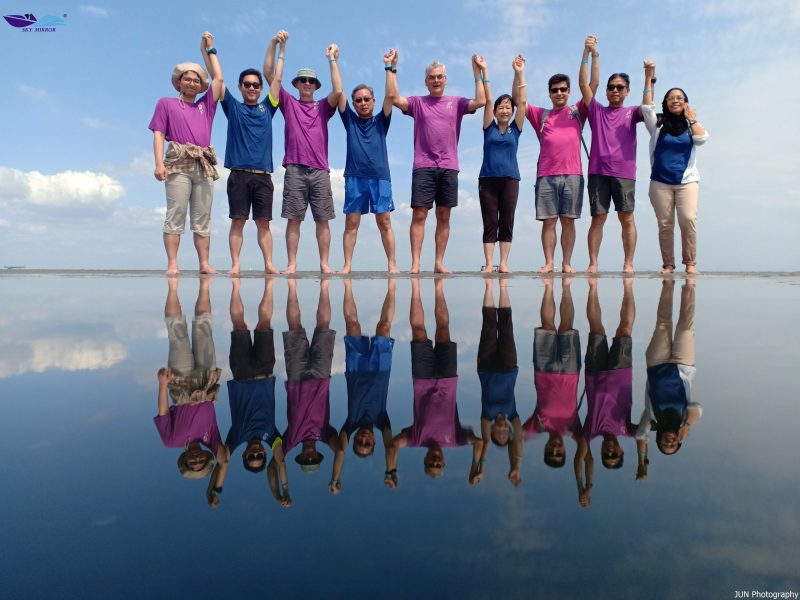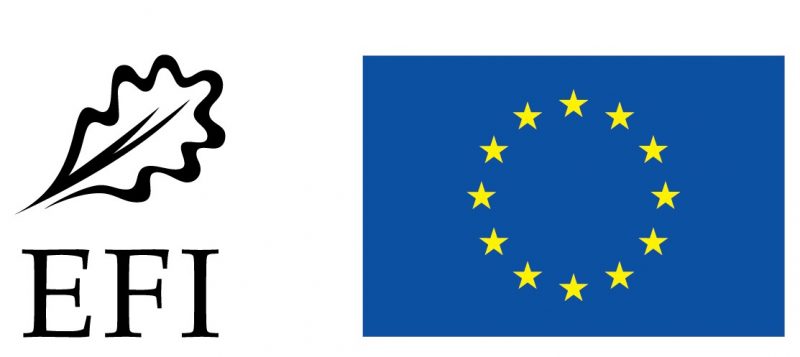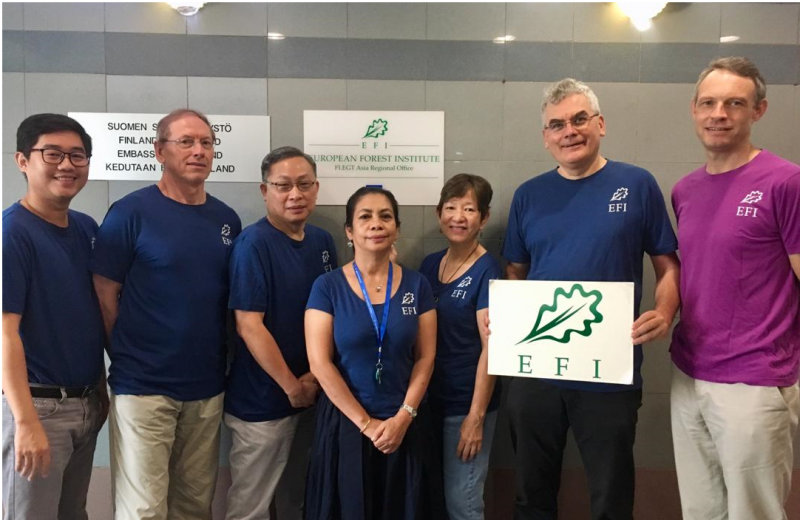
This site
is mobile
responsive

The European Forest Institute (EFI) is an international organisation, headquartered in Joensuu, Finland, with other European offices in Belgium, Germany and Spain. EFI has 29 member countries; 130 member organisations from 40 different countries (not all European), representing almost 10,000 international researchers.
EFI works in diverse research fields related to natural resources management and climate change. It provides forest-related knowledge in three interconnected and interdisciplinary themes, namely bio-economy, forest resilience and forest governance. EFI receives funding from the European Commission, European Union (EU) member states and numerous international sources.
Under its forest governance theme, EFI has been supporting the EU’s Forest Law Enforcement, Governance & Trade (FLEGT) Action Plan, in particular FLEGT Voluntary Partnership Agreements (VPA) with ASEAN member states since 2007. For this purpose, a regional office in Asia was set up to support timber producing countries in the region to put in place legality systems, ensuring that legal timber is sold globally.

When the EFI started searching for office space for an Asia regional office, the organisation had three priorities to consider:
I. Security and safety
As a natural first step, EFI contacted several EU Delegations to ASEAN countries, including the EU Delegation to Malaysia. The delegations assured EFI of Kuala Lumpur’s reputation in terms of security and safety. There are also several EU member states’ Embassies located in the vicinity and along Jalan Ampang that is considered the Embassy Row. These include the embassies of Germany, The Netherlands and the United Kingdom which were enthusiastic about an EFI Asia Regional Office in their vicinity to strengthen communications and collaborations between both organisations. By an ideal coincidence, the Embassy of Finland offered office space within its premises to EFI.
II. Connectivity
EFI was enticed by Kuala Lumpur’s excellent infrastructure and its international flight connectivity as the Asia Regional Office would need to be strategically located with easy access to partner countries in the region and to the rest of the world, especially Europe. The Kuala Lumpur International Airport (KLIA) and attractive option of using low-cost carriers to fly inexpensively and quickly to various destinations in ASEAN +3 countries was Kuala Lumpur’s pull factor.
III. Expatriate living conditions and costs
Given that the Asia Regional Office is part of the global EFI network and would have to attract high-calibre international experts to relocate with their families, among the most important considerations for EFI was the availability of good quality education and health services. In this regard, Kuala Lumpur fits the bill for its availability of international private schools as well as medical specialist centres and hospitals offering one of the best affordable health services in the region, if not the world. Additionally, some research led EFI to conclude that cost and living conditions were comparatively better than most major cities in the region. Besides, traffic, ease of communication in English and quality of IT infrastructure were also important.
Ultimately, the EFI Asia Regional Office was established at the end of 2009. EFI chose Kuala Lumpur due to the fact that it offers the complete package, not only just winning on one out of the few criteria that had been prioritised. The Malaysian Government also had clear policies and guidelines on the setting up of a regional office. It was easy for EFI representatives to communicate with officials, with minimal to and fro of documents submissions.
Contribution to forest governance in ASEAN
EFI has worked for the past 10 years in Kuala Lumpur to raise awareness about the EU’s FLEGT Action Plan that was put in place in 2003. The EU is continuing to negotiate for the FLEGT Voluntary Partnership Agreements (VPAs) with individual timber producing countries in ASEAN to set up legality assurance systems to ensure that legal timber is sold globally. The experts at the EFI Asia Regional Office have contributed significantly to the development of these systems.
Currently, eight out of ten ASEAN member states are in dialogue or information exchanges with the EU with five (Indonesia, Malaysia, Laos, Thailand and Vietnam) in various stages of VPA negotiation or implementation processes. Indonesia has advanced the furthest and for the past three years, since November 2016, has been implementing the agreed timber legality processes in their VPA with the EU.
EFI Asia experts work to support the European Commission in Brussels, the EU Delegations in various Asian member states, EU member states and, last but not least, ASEAN partner countries in negotiating and implementing VPAs, technical exchanges and informational support. Other ASEAN member states, Myanmar, Cambodia and the Philippines too have benefitted indirectly.
The Asia Regional office has thus contributed significantly in promoting forest governance capacity in ASEAN, both at individual country levels and regionally. It is done directly through technical input and process support in the negotiating countries while building and strengthening networks for FLEGT at regional level to increase sustainable forest governance.
The EFI Asia Regional Office has worked to organise and fund Timber Legality Assurance (TLA) workshops for the government, private sector and civil society sectors from most of the ASEAN member states. To further enrich the discussions, participants are brought in from major Asian timber consumer markets such as India, China, Japan and South Korea. For the past seven years, there have been five TLA workshops with support from no less than 150 ASEAN participants, including Malaysia.
Looking forward to an enhanced work programme in ASEAN
In August 2020, the EU has approved a new Regional-ASEAN Forest Governance Support Programme (EU FLEGT Asia Programme) to further the work done by EFI in Asia on FLEGT. It will be to a tune of EUR5 million over a period of three years. This programme will assist ASEAN member states in enhancing and further demonstrating good forest governance and sustainable forest management.
Additionally, EFI will continue its work to support the micro and small entities within the timber sector in the Mekong region as well as advocating for the improvement of land-use governance, reduction of deforestation and forest degradation as part of the global climate change agenda.
For the next three years, EFI will fortify its work for FLEGT in Asia, through:
On regional level, EFI will help ASEAN to further develop regional frameworks and guidance, activate and invigorate multi-stakeholder forums and collaborate with regional partners synergistically.
An exciting new Partnership Programme was recently added to the current portfolio of EFI in Asia on sustainable palm oil production in Malaysia and Indonesia. EFI has begun dialogues with the Malaysia’s Ministry of Plantation Industries and Commodities; and palm oil agencies to build dynamic and forward-looking programmes.
